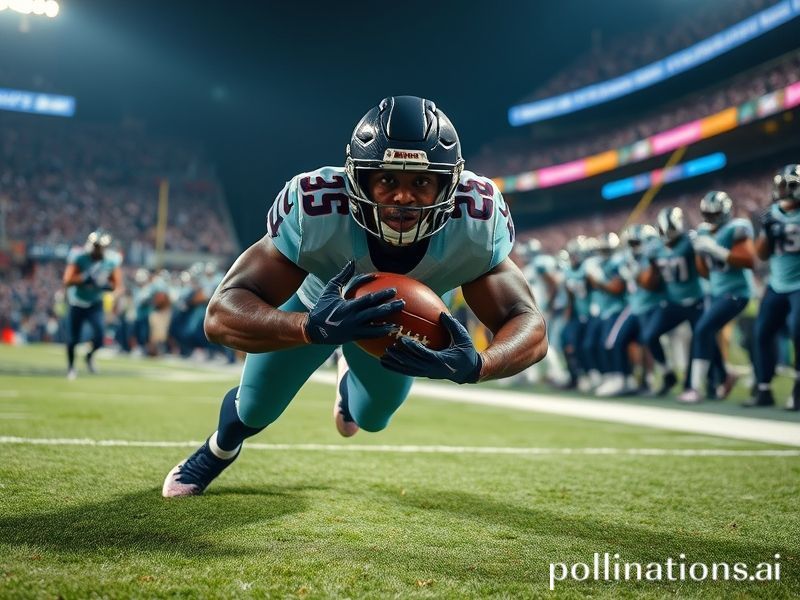Global Groan: How Derrick Henry’s Fumbles United the World in Shared Disappointment
**The Global Fallout of Derrick Henry’s Fumbles: When a Football Drop Shakes the World**
*By our correspondent, still recovering from the existential dread of Monday Night Football*
GENEVA—In a world teetering on the brink of economic collapse, climate catastrophe, and the resurgence of 1980s fashion, it takes a special kind of event to unite humanity in collective despair. Enter Derrick Henry, the Tennessee Titans’ human bulldozer, who this week treated the football like a bar of soap in a Turkish bathhouse, fumbling not once, but twice in a single game. While American audiences mourned their fantasy leagues, the rest of the planet—those who still acknowledge American football as a sport and not just padded rugby for the emotionally fragile—processed the implications with the weary resignation of a UN sanctions committee.
From Nairobi to Naples, the reverberations were felt. In Nairobi’s Kibera slums, a group of Manchester United fans watching on a cracked smartphone screen collectively winced as Henry coughed up the ball, their sympathy rooted in familiar trauma. “Even we don’t drop things that often,” observed local baker and Arsenal supporter Kamau Mwangi, “and we’re literally baking bread during power outages.” The irony, of course, being that Henry’s fumbles occurred under stadium lighting bright enough to power a small village—something the NFL’s international marketing department prefers not to highlight in their global outreach programs.
Across the Atlantic, European reaction ranged from bemused superiority to genuine concern. In Paris, where existential dread is a national pastime, philosophers seized upon Henry’s butterfingers as metaphor for modern civilization’s inability to hold onto what truly matters. “The ball represents truth,” declared Sorbonne professor Michel Dubois over a cigarette that somehow tasted like disappointment. “And we are all Derrick Henry, fumbling through the darkness of late capitalism.” The French, naturally, found poetry in failure—something Americans have yet to master, preferring instead to scream at television screens while consuming cheese that comes in aerosol cans.
The economic implications stretched further than Tennessee’s GDP. Asian markets, ever sensitive to American emotional volatility, braced for impact. Tokyo’s Nikkei index dipped 0.3% as news broke, with analysts citing “gridiron uncertainty” as a contributing factor. Meanwhile, in Shanghai, bootleg Henry jerseys suddenly included optional Velcro football attachments—“for authentic fumbling experience,” according to one vendor who requested anonymity but definitely operates from a stall near the Bund.
Perhaps most poignantly, the incident highlighted our species’ remarkable capacity for shared disappointment. In a divided world where even vaccines become political weapons, strangers across continents could unite in their sympathy for a man paid millions to occasionally drop an inflated piece of leather. From Syrian refugees streaming the game on cracked phones in Istanbul coffee shops to Australian miners finishing their shifts just in time to catch the replay, humanity collectively sighed that familiar sigh—the one reserved for witnessing potential greatness stumble at the finish line.
The United Nations, ever vigilant for opportunities to appear relevant, issued a statement that nobody requested. “Mr. Henry’s fumbles remind us that we all drop the ball sometimes,” read the press release, presumably written by an intern with a literature degree and crippling student debt. “What matters is how we recover.” Deep wisdom from an organization that hasn’t successfully recovered from its own fumbles since 1945.
As the world spins madly on, Derrick Henry’s momentary lapses serve as comfort food for the globally anxious—a reminder that even titans stumble, even gods drop their lightning bolts, and sometimes the universe’s cruelest joke is letting us peek behind the curtain to see that our heroes are just as human as the rest of us, only with better agents and worse insurance policies.
In the end, perhaps that’s the true international language—not love, not music, but the universal groan of shared disappointment. Even if we can’t agree on climate policy or economic systems, we can all agree that watching someone fumble away victory never gets old, even when we’re secretly grateful it wasn’t us.







